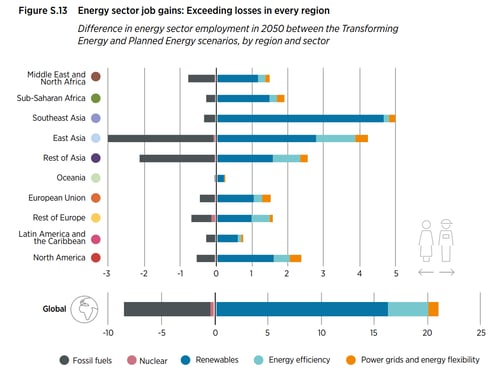Cognician CSO, Colin Sloman, discusses the challenges and importance of reskilling oil and gas workers for a sustainable future.
There has been much debate on the importance of the energy sector getting on board with climate action in recent months. Discussions center around developing technologies that will serve the increasing demand for energy without adding to an already-too-hot planet. However, what is not being talked about are the workers who will develop these technologies. Does the energy sector workforce have the right skills to transition?
This latest challenge for the oil and gas (O&G) industry reminds me of the last skills panic in the mid-2000s, referred to as the 'Great Crew Change'. Back then, there was a commonly held belief that the energy industry would suffer from a skills gap because the workforce was rapidly aging, and there wouldn't be enough new workers to replace them. It turns out this wasn't a problem at all. However, as we enter the energy transition era, the Great Crew Change has finally arrived.
There is no doubt that employment in the production of fossil fuels will continue to decline. The IEA suggests that there will be a loss of around 5 million jobs by 2030. But don't panic!
The IEA also suggests that in their roadmap to net-zero emissions by 2050, "an estimated 14 million new jobs are generated in energy supply … resulting in a net gain of 9 million jobs in this pathway." What's even better is that according to the IRENA global renewables outlook report, "Energy sector job gains will exceed losses in every region." (see graph below)

According to the IRENA report, across the globe, albeit unequally across regions (see graph below), there will be demand for jobs in flexible power grids, energy efficiency, renewables, and also fossil fuels and nuclear. By 2050 there will be a predicted 42 million renewable energy jobs in the bioenergy, solar, hydro, wind, geothermal, and ocean sectors.
It’s important to note that the new energy sector is competing for STEM workers with advanced analytics, machine learning, and robotics skill sets. And as hiring managers know, and a McKinsey report confirmed, "a decade ago, O&G was the 14th most attractive employer among engineering and IT students; now, it is 35th." The wider industry has a big job to reposition a career in energy away from the dirty carbon-intensive world of oil & gas to the shiny new world of renewables and high-tech.
.png?width=496&name=220207%20oil%20and%20gas-%20paragrah%20(2).png)
A key business issue for the energy sector will be transforming and reskilling their existing workforce. Organizations will need to ensure that their employees are agile and ready for and accepting of the change, fostering teamwork.
A recent report released by Accenture reinforced this by stating that there is also, "a demand from society for] for environmental accountability, a growing scarcity of talent and investor apathy. The result is an energy industry tasked with an agenda for business transformation – change that requires a highly-skilled, engaged workforce." They also found that reskilling your workforce is six times cheaper than finding new talent.
It gets better! Accenture suggests "that 33-55% of existing petro-technical skills are close to the skills needed …for the energy transition." A good example of this is the hydrogen (H2) sector. This emergent energy source is a great opportunity for O&G workers looking to leave fossil fuel production. Except for electrolysis, every process in an H2 production facility has been used extensively. The available workforce has only a few gaps in capabilities. How do we get them to where they need to be?
Filling the skills gap requires managers and employees to be empowered with learning experiences that enable them to learn new skills, learn new tools, and put what they have learned into practice immediately.
Cognician is ideally placed to help in this transition.
Our platform offers a wide range of capabilities including multi-day challenges, workforce assessments, and digital coaching for team transformation. These tools combined with our award-winning methodology enable organizations to build adaptive capacity to respond to the skills gap in the energy sector.
Book a call with us today to discuss how we can help you manage change in your organization.





